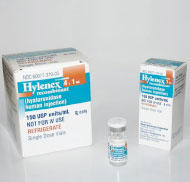
“We have never had anyone have an issue with hyaluronidase injections in this office. The most common side effect is bruising, which can happen with any type of injection. Bruising should resolve within a week or two,” stated Rueckl.
Las Vegas, Nevada (PRWEB) February 25, 2013
Dr. Rueckl of Lakes Dermatololgy explained that many patients arrive at his office with less than desirable results after receiving filler in all the wrong places. “My lips look ridiculous. Is there anything you can do?” questioned a recent patient. Overfilling or misplaced filler can result in a misshapened cupids bow or nasolabial fold (parenthesis next to nose and lips).
Lakes Dermatology, Las Vegas, Nevada Introduces Hyaluronidase
Making adjustments to fillers is nearly as much as an art form as injecting fillers to begin with. Because of his surgical skill and his artistic cosmetic abilities, Dr. Rueckl is often sought after to fix fillers gone awry from other injectors. There are issues, particularly in Nevada, with under-experienced injectors doing fillers, which can lead to various problems including over- or under-filling, putting fillers into the wrong facial contours, using the wrong types of fillers, blocking blood flow, and generally creating odd looks. It is the opinion of Lakes Dermatology that one should always seek a board-certified core injector for fillers, Do not shop for the cheapest price, but instead, the most experienced physician. All filler injections and adjustments to fillers are done by Dr. Rueckl at Lakes Dermatology.
Dr. Rueckl is skilled at doing many types of corrections. Hyaluronidase only works on fillers that are composed of hyaluronic acid. In cases where the patient doesn’t have hyaluronic acid filler, but instead have RADIESSE®, Sculptra, or even silicone, Dr. Rueckl has surgically removed and corrected many issues with these. A consultation would be needed for this type of procedure because each case is unique. However, if the patient has had hyaluronic acid fillers, like Restylane®, JUVÉDERM®, Belotero, or others, hyaluronidase is an injectable enzyme that breaks down these types of fillers with a more simple procedure.
What is Hyaluronidase and what does it do?
Hyaluronidase is an enzyme (compounded by special pharmacies) that causes hydrolysis (breakdown) of hyaluronic acid. It is often referred to as a reversal agent for hyaluronic acid-based fillers. When the enzyme is injected it dissolves the synthetic hyaluronic acid filler, leaving the patients own hyaluronic acid intact.
In some cases, for full correction of fillers, Dr. Rueckl may recommend fixing a patient’s filler by adding another syringe(s) of filler into one area, and removing some filler from another. This is recommended when filler is placed into the wrong area to begin with. One cannot have additional filler added and get hyaluronidase on the same day—the enzyme doesn’t know which filler is new and which is old, and it will start dissolving both. Therefore, if you need more filler added, as well as some taken out, multiple visits will be required. This is often the case with filler correction.
Where is Hyaluronidase used?
Hyaluronidase is used to dissolve hyaluronic acid fillers that have been placed incorrectly, excessively, or unevenly. It is injected into the same locations where the filler already is. It does not remove all of the filler entirely, and Dr. Rueckl will decide how much hyaluronidase to inject based on how much filler needs to be removed.
What is a Hyaluronidase treatment like?
Hyaluronidase is injected, along with lidocaine (and sometimes epinephrine), into the area where the filler needs to be dissolved. The injection is very easy for most people to tolerate, but it can sting a bit, so the lidocaine is used for numbing purposes to alleviate this sensation.
There have been a few reports that some people may have an allergy to hyaluronidase, which happens to those who are allergic to bee stings. “We have never had anyone have an issue with hyaluronidase injections in this office. The most common side effect is bruising, which can happen with any type of injection. Bruising should resolve within a week or two,” stated Rueckl.
The most difficult aspect of using hyaluronidase is judging the amount required to dissolve a certain amount of filler, so over- or under-dissolving can occur, which means the patient may need to return to the office for follow-up procedures. Remember that it’s nearly as much of an art to remove filler as it is to inject it in the first place.
Hyaluronidase works very quickly, with most of the effect taking place within 24 hours. The patient should be able to see defined improvement and less filler in the area injected, beginning within a few hours.
Hyaluronidase
After a few days if the patient still has areas that need correction, that patient can see Dr. Rueckl for another round of hyaluronidase, or for additional syringes of filler to be added. Remember that the patient cannot have hyaluronidase done and additional filler added into the same area, on the same day.
How much does a Hyaluronidase treatment cost?
Each round of hyaluronidase costs between $100-$200 for the enzyme injection, depending on how much is needed. It may require more than one session to achieve adequate filler dissolving. Adding any additional fillers would cost the regular prices of those syringes, on another day.
For more information, contact Lakes Dermatology 702-869-6667.


